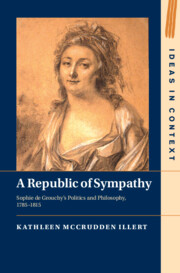Book contents
- A Republic of Sympathy
- Ideas In Context
- A Republic of Sympathy
- Copyright page
- Dedication
- Contents
- Acknowledgements
- Abbreviations
- Introduction
- Chapter 1 The Letters, 1786
- Chapter 2 The Wheel, 1785–1789
- Chapter 3 The Revolution, 1789–1793
- Chapter 4 The Republic, 1791–1793
- Chapter 5 The Publication, 1794–1799
- Chapter 6 The Mask, 1799–1804
- Chapter 7 The Poet, 1804–1810
- Chapter 8 The Thread, 1798–1815
- Conclusion
- Appendix: Attributions
- Bibliography
- Index
Chapter 6 - The Mask, 1799–1804
Published online by Cambridge University Press: 18 December 2024
- A Republic of Sympathy
- Ideas In Context
- A Republic of Sympathy
- Copyright page
- Dedication
- Contents
- Acknowledgements
- Abbreviations
- Introduction
- Chapter 1 The Letters, 1786
- Chapter 2 The Wheel, 1785–1789
- Chapter 3 The Revolution, 1789–1793
- Chapter 4 The Republic, 1791–1793
- Chapter 5 The Publication, 1794–1799
- Chapter 6 The Mask, 1799–1804
- Chapter 7 The Poet, 1804–1810
- Chapter 8 The Thread, 1798–1815
- Conclusion
- Appendix: Attributions
- Bibliography
- Index
Summary
Chapter 6 details the shift that occurred in Grouchy’s thought following Napoleon’s coup of 18 brumaire. Initially supportive of the new regime, she quickly became disillusioned with what she perceived as Napoleon’s authoritarian suppression of political dissent. She feared that humans, in the face of a menacing state, would seek to mask their intentions, rendering sympathy – on which her political vision was founded – ineffectual. She thus developed a newly suspicious view of governmental intrusion into the sentiments of the populace, and discarded her ideal, developed during the early days of the revolution, of the state playing a central role in fostering the political emotions of the people. These ideas were developed over the course of anonymous articles in the journal, Le Citoyen français, that she launched in 1799 with her lover, Maillia Garat, and a proposed new edition of seventeenth-century moralist La Rochefoucauld’s Maximes, conceived together with her next romantic partner, Claude Fauriel. This Chapter draws on Fauriel’s unpublished manuscript, The Last Days of the Consulate, as further evidence of their joint ideas, especially their increasing suspicion of Napoleon and their distaste over his use of his secret police to spread fear and encourage duplicity.
Keywords
- Type
- Chapter
- Information
- A Republic of SympathySophie de Grouchy's Politics and Philosophy, 1785–1815, pp. 148 - 172Publisher: Cambridge University PressPrint publication year: 2024

